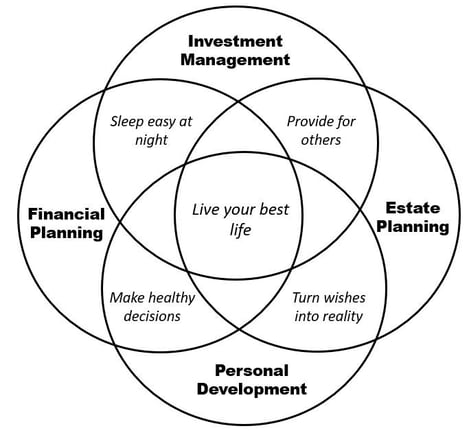The Perfect Financial Plan
January 13th, 2020 | 4 min. read

 Something we emphasize when meeting with new clients is that their financial plan is dynamic. The goal is to continuously work toward or preserve the life you want. So, it changes as market conditions, government policy, economic factors and personal financial conditions make it necessary to change. It changes as your life changes. In other words, it is never perfect.
Something we emphasize when meeting with new clients is that their financial plan is dynamic. The goal is to continuously work toward or preserve the life you want. So, it changes as market conditions, government policy, economic factors and personal financial conditions make it necessary to change. It changes as your life changes. In other words, it is never perfect.
An imperfect plan may at first sound like a bad plan. After all, who doesn’t want the best, most perfect financial plan?
But the definition of perfect is itself fluid. Perfection is ephemeral. The perfect life you planned for 10 years ago probably doesn’t seem so perfect anymore.
At one time, a retiree may think the perfect life is trading a home for a backpack and traveling around the world. Fast forward 10 years and perfection is receiving quality health care in order to walk the grandkids to school every day.
“Strive for continuous improvement, instead of perfection.” – Kim Collins, World Champion sprinter
Perfection, or the life you want to live, is essentially always a work in progress, as is the financial plan to help you get there. Whether you do the heavy lifting or not, there are always things at work – your automatic 401(k) contributions, your investment portfolio, etc. – that are meant to take you one step closer.
Focusing on the goal and not the process often leads to failure.
Consider that most Americans don’t have a financial plan, and many don’t consider their finances substantial enough to need one. Even though research indicates planners save more, carry less debt and feel more confident in their futures. Non-planners are too preoccupied with numbers, as if they need wealth first before creating a plan to build wealth.
Instead, it’s better to think of managing money as a form of personal development – to develop your abilities and enhance your quality of life – rather than a numbers game.
Financial planning as personal development
The beginning of the year is when most people focus on improving themselves. (New year, new me!) Millions of people make resolutions to live healthier, to think more calmly and optimistically, to build job skills, and so on.
Yet, most resolution makers quit in just a matter of weeks. Reality sets in. You realize you won’t reach perfection. You can’t work out once and be fit for the rest of the year. You must remind yourself to be kind every day. The job market is always competitive and you have to keep learning to stay ahead.
It all requires long-term commitment. The same is true for your money.
Just as popular as health resolutions are financial resolutions, such as eliminating debt and saving more for retirement. (Although people don’t flood into financial offices as they do gyms in January.) Perhaps because they both come from the same place: physical and mental strain.
Money is by far the top source of stress for Americans, according to the American Psychological Association. Financial stress leads to lower work productivity, higher rates of depression and anxiety, less exercise, migraines, gut issues, high blood pressure and heart attacks, and poor sleep.
People exercise and diet to feel better; people budget and plan to feel better.
A common misconception is that financial stress is found only among people with financial troubles. But affluent individuals are just as susceptible. In a Bank of America survey of more than 1,000 “mass affluent” people, 59% of respondents said financial worries impacted their mental health and 56% said their physical health was also affected.
Even if you have a nice nest egg, you may still face financial challenges. How do I take care of my aging parents? What is my health going to be like years from now? How can I help children graduate debt-free? What will a market downturn do to my portfolio?
And, that brings us back to perfection.
Sure, it would be nice to have one financial plan that serves you for life, just as it would if you could buy six-pack abs off the shelf. But that’s not how it works, nor how you should want it to work. Life changes. We find new interests. We grow older. Your finances, therefore, should change, too.
Like personal development, financial planning is a continued pursuit of living the best life you can.

Note: For simplicity’s sake, let’s just consider other financial categories – insurance, tax planning, etc. – fall under the broader categories of financial planning and investment management and estate planning.
Effective ways to improve your financial life
Break down goals into clear, achievable steps. Wealth. Retirement. An ideal life. These are worthy goals. But they’re big, long-term goals that require many steps to achieve. It’s those small, manageable steps that you want to focus on. They will provide benefits that compound enough to reach those loftier aspirations. Maybe you commit to saving 1% more in your 401(k). Or, maybe this is the year you get a will. Every step you take in a day or a month or a year can make huge differences over the long term. Take it from Confucius: “The man who moves a mountain begins by carrying away small stones.”
Build good habits. Goals are important, but habits are more important. It is the things you do, the consistent actions you take, that ultimately matter. As author and entrepreneur James Clear writes in his book Atomic Habits: “The purpose of setting goals is to win the game. The purpose of building systems is to continue playing the game. True long-term thinking is goal-less thinking. It’s not about any single accomplishment. It is about the cycle of endless refinement and continuous improvement. Ultimately, it is your commitment to the process that will determine your progress.”
Find an accountability partner. Sharing your goals with someone else can help keep you on track – as long as you pick the right accountability partner. Find someone you look up to. A recent Ohio State University study found that people who shared their goals with someone they highly respected and considered as “higher status” were more committed to achieving them. This is a benefit of working with a financial adviser, who can actively monitor your progress and provide informed encouragement along the way.
Committing to enhancing your life, which can mean enhancing the lives of those around you, in whatever form makes you happy at the time. Now, that sounds like the perfect plan.
Advance Capital Management is a fee-only RIA serving clients across the country. The Advance Capital Team includes financial advisers, investment managers, client service professionals and more -- all dedicated to helping people pursue their financial goals.
